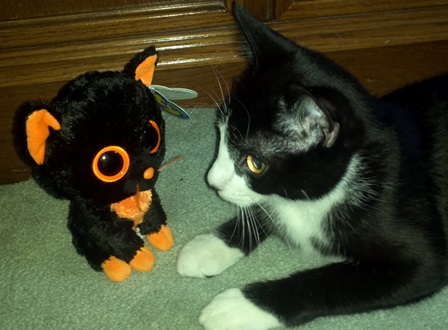Black cats get a bad rap even on Halloween
Halloween and black cats go hand in hand. However, did you know that adoption data has indicated that black cats stay longer in shelters and are considered less adoptable than cats of other colors? Our black feline friends are therefore subject to needless euthanasia more so than other pets.
Yet, black cats are famous at Halloween. We see them everywhere with their back arched, tail upright, eyes gleaming and claws drawn. Folklore presents them as frightening and with the ability to impart bad luck if its path is crossed.
This is all superstition for those of us who own black cats and know full well how loving they are and what great companions they make. Nonetheless, the data indicates otherwise.

Dr. Lori Kogan, a Colorado State University associate professor and licensed psychologist who studies human-animal interactions, and CSU colleagues recently examined color-coded adoption data (nine years of adoption data from the Larimer Humane Society in Fort Collins and 18 years of data from the Dumb Friends League of Denver).
“Our results suggest that it requires approximately three more days for adult black cats to be adopted compared to cats with black as a primary coat color, such as ‘tuxedo’ cats, and it takes four to six more days for black cats to be adopted when compared to cats of other colors,” said Kogan, who works in the CSU Department of Clinical Sciences. “Interestingly, this trend remains consistent, regardless of whether the cat is an adult or juvenile.”
That’s worrisome for black cats because of high rates of euthanasia and feline disease among shelter cats, Kogan said.
Studies have shown more than 70 percent of all cats in animal shelters are euthanized, about 25 percent of shelter cats are adopted, and a small percentage of lost cats are reunited with their owners.
The bottom line, Kogan said, is that human perceptions and notions have a bearing on animal health.
“How people think about animals influences pet health and well-being,” she said. “This is true whether people’s ideas are fact-based or based on myth. We need to take these ideas into consideration when we are working to promote animal health.”
So the next time you are visiting an animal shelter or considering adopting a new cat, forget the myths. Forget the idea that “white is good and black is bad.” Maybe forget color altogether, and find the one cat that gravitates to you, regardless of color. Or better yet, go straight for that black beauty sitting quietly in the corner or purring up a storm in the center of the room. You might be glad you did.
Happy Halloween!
Susan, Taurus and Gemini